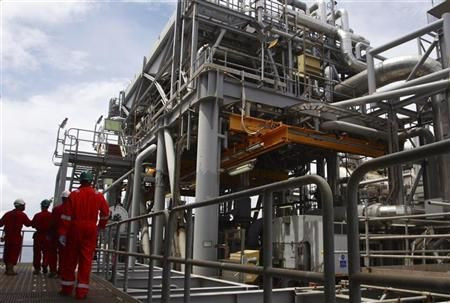Ghana Empowered: Natural Gas Import Facility Could Ease Impending Energy Crisis

Lights are flickering in the West African country of Ghana, where a rapidly expanding economy is increasingly burdened by an energy sector that can't keep up. But, new plans to build a floating terminal for liquefied natural gas, or LNG, imports could help generate as much as 1,500 MW of electricity by 2016.
"It's always good to have liquefied gas on a long-term supply basis," Kofi Ellis, director of planning at Ghana's state-run power utility, told Reuters. "We have spoken to Angola, we have spoken to Mozambique, we have spoken to Nigeria," Ellis added, emphasizing that African sources of natural gas would be prioritized over other international partners.
The planned terminal would be capable of processing 450 million cubic feet of gas a day. Feasibility studies, which would include cost estimates, are expected to be completed within months and will be followed by a fundraising period before construction can begin.
The Ghanaian economy is projected to expand by 8 percent this year, and the government maintains that the middle class now accounts for about 40 percent of the population. But, growth can only go so far when the lights don't work, and Ghana is reaching its breaking point.
For now, the country relies mostly on hydropower to keep the lights on. But outages aren't uncommon, and analysts agree that the government is running out of time to diversify its energy sources. Demand currently stands at about 1,750 MW and is projected to reach 3,300 MW over the next seven years.
"Our concern," said World Bank Country Director for Ghana Yusupha Crookes at the launch of an energy report this July, “is about the ordinary self-employed dress maker or barber, who is now struggling to keep the business going; about hospital operating theaters that experience [blackouts] in the middle of surgery; about industries that are obliged to spend huge sums to run their own generators on diesel in order to keep their production going.”
Ghana already imports natural gas from Nigeria via the West Africa Gas Pipeline, but supply has been inconsistent due to security concerns and infrastructure issues. Ghana also produces hydrocarbons at its offshore Jubilee oil field, which began commercial production in 2010 and produces up to 115,000 barrels of oil a day.
The natural gas produced there is currently reinjected undersea, but will be used for power once a pipeline and processing plant project, led by China's Sinopec, is finished. Despite months of delays, the plant may become operational next year and officials hope to produce about 140 million cubic feet of natural gas daily for domestic consumption as well as exports.
The liquefied natural gas terminal will further bolster Ghana's energy supply, and officials hope the added capacity will not only satisfy domestic demand, but also put Ghana in a position to become a net energy exporter.
© Copyright IBTimes 2024. All rights reserved.
Join the Discussion



















